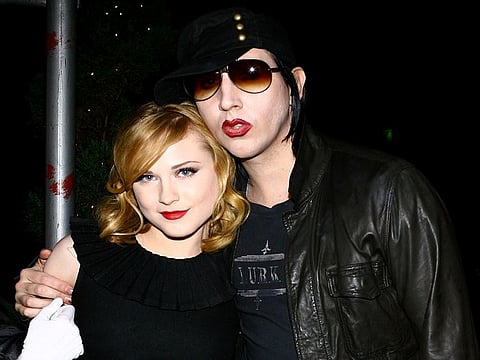How Evan Rachel Wood’s accusations against Marilyn Manson bring #MeToo into spotlight
As the actress’ claims shock the public, we take a look at the history behind it

Over the years, actress Evan Rachel Wood has repeatedly told her story of horror and abuse in the hopes that she can bring about change in the world.
In a 2019 video on YouTube, in which she testifies in front of the California Senate Public Safety committee on behalf of a bill to support victims of domestic violence, she can be seen holding back tears as she gives a fuller picture of that story.
“He started to cut me off from my close friends and family, one by one, by exhibiting rage in some form or another when I was in contact with them,” she says about an unnamed man whom she met when she was 18.
“By the time I realised I was in a bad situation, I felt completely trapped and terrified for my life,” she recalled. “If I tried to sleep, he would throw things at me, or instruct me to do drugs, which would disorient me, and keep me awake, sometimes for days.
“Once I was weakened by no sleep and little food, he would sometimes force me to partake in acts of fear, pain, torture, and humiliation, which he would videotape and which I felt powerless to stop. Only after the acts were done, was I allowed to sleep.”
On February 1, Woods revealed that her alleged abuser had been musician Marilyn Manson, whom she met and dated when she was a teenager and he was in his late 30s.
“The name of my abuser is Brian Warner, also known to the world as Marilyn Manson,” Wood wrote in an Instagram post. “He started grooming me when I was a teenager and horrifically abused me for years. I was brainwashed and manipulated into submission. I am done living in fear of retaliation, slander, or blackmail. I am here to expose this dangerous man and call out the many industries that have enabled him, before he ruins any more lives. I stand with the many victims who will no longer be silent.”
A number of other women simultaneously made statements accusing the musician of sexually and physically abusing them, all of which Manson has denied.
Manson, 52, put out his own statement on Instagram.
“Obviously, my art and my life have long been magnets for controversy, but these recent claims about me are horrible distortions of reality,” Manson posted. “My intimate relationships have always been entirely consensual with like-minded partners. Regardless of how — and why — others are now choosing to misrepresent the past, that is the truth.”
But some say that Wood’s claims shouldn’t come as a shock. In an opinion piece, attorney and author Jill Filipovic says that it was “one the worst-kept secrets in the music industry” that Manson was the person Wood had referenced in her accounts of being abused by a partner when she was a teen. Filipovic also points out the musician’s 2009 interview with Spin following his breakup with Wood.
Also Read: Taapsee Pannu recalls her #MeToo story
Also Read: #MeToo in Pakistan: Has it been fruitful?
“The song ‘I Want to Kill You Like They Do in the Movies’ is about my fantasies,” Manson said in that interview, referring to Wood. “I have fantasies every day about smashing her skull in with a sledgehammer.”
It’s unclear how the ‘Westworld’ actress will move forward with this information about the man who for a short while was her fiance. But one thing is apparent, the public reckoning that was triggered by the #MeToo movement in 2017 still holds power.
Loma Vista, the music label that released Manson’s latest recording, said it would stop promoting it and would not work with him in the future.
“In light of today’s disturbing allegations by Evan Rachel Wood and other women naming Marilyn Manson as their abuser, Loma Vista will cease to further promote his current album, effective immediately,” it said in a statement posted on Twitter. “Due to these concerning developments, we have also decided not to work with Marilyn Manson on any future projects.”
Manson has also been dropped from various TV projects. AMC’s Shudder has removed him from its horror anthology series “Creepshow,” according to Deadline, and Starz vowed to cut Manson from an upcoming episode of 'American Gods'.
“Starz stands unequivocally with all victims and survivors of abuse,” the network said in a statement shared on social media. “Due to the allegations against Marilyn Manson, we have decided to remove his performance from the remaining episode he is in, scheduled to air later this season.”
The now 33-year-old Wood had explained in 2019 that she did not report her abuser to authorities because the statute of limitations had long since passed, and that she chose not to name him because she felt she had to come to terms with her own story first. “It took me so long to process everything and to get to a place where I felt even safe enough to speak about the abuse. And it’s scary,” she said in Harper’s Bazaar.
Looking back at the #MeToo movement
After her statement, many stars showed their support for Wood, including actress Rose McGowan who was once engaged to Manson and was one of the first people to accuse movie mogul Harvey Weinstein of abuse at the start of the #MeToo movement.
“I stand with Evan Rachel Wood and other brave women who have come forward,” McGowan wrote on Twitter. “It takes years to recover from abuse and I send them strength on their journey to recovery. Let the truth be revealed. Let the healing begin.”
“Brava to brave warrior Evan Rachel wood for your courage and strength coming forward about the horrific abuse you’ve experienced and to all the other brave warriors who come forward about their abusers,” tweeted actress Rosanna Arquette, another Weinstein survivor. “Trauma lives inside survivors and can take awhile to surface and heal.”
The term #MeToo was first coined by sexual harassment survivor and activist Tarana Burke in 2006 in order to empower women to tell their stories and seek solidarity with others.
This term later spread like wildfire after actress Alyssa Milano posted on Twitter in October 2017: “If all the women who have been sexually harassed or assaulted wrote ‘Me too’ as a status, we might give people a sense of the magnitude of the problem.”
A few days earlier, actress Ashley Judd wrote an explosive op-ed in the New York Times accusing the powerful Hollywood producer Weinstein of lewd and abusive behaviour.
“Women have been talking about Harvey amongst ourselves for a long time, and it’s simply beyond time to have the conversation publicly,” Judd said.
In her op-ed, she wrote about how she was lured into his hotel room under the guise of work. However, Weinstein approached her in bathrobe and asked her to give him massage.
In the years since then, the dominoes have kept toppling over: actor Kevin Spacey, comedian Louis CK, music producer Russell Simmons, actor James Franco, singer R Kelly and others have been slammed with accusations. While stars such as Taylor Swift, Uma Thurman, Kesha, Gabrielle Union, Lupita Nyong’o and countless others also emphatically said “me too”.
Outcomes of the #MeToo movement
Two of the major legal developments spurred on by the #MeToo movement were the convictions of comedian Bill Cosby and Weinstein for rape. Cosby received a 3 to 10-year sentence for drugging and sexually assaulting a woman in 2014. Weinstein was sentenced to 23 years in prison after being found guilty of sexually assaulting former production assistant Mimi Haleyi and raping former aspiring actress Jessica Mann.
Legal battles are underway for other cases. In December 2020, singer FKA twigs filed a lawsuit against ex-boyfriend actor Shia LaBeouf. She has accused him of a myriad of things including physical, emotional and sexual abuse. The civil lawsuit, filed in Los Angeles Superior Court, seeks unspecified damages.
Singer R Kelly is now in jail after almost two decades of being routinely accused of sexually abusing minors. A July 2017 report by Buzzfeed that claimed Kelly had been keeping women in a cult, along with a documentary ‘Surviving R. Kelly’ sparked renewed interest in all the allegations, and that led to criminal charges being filed in multiple US states against the ‘I Believe I Can Fly’ singer.
Comment: Has #MeToo done what it set out to do?
When Tarana Burke created the term #MeToo, she was hoping to unite marginalised people and offer them support in a world that is disbelieving of assault survivors — whether they are women, men or children.
I’m not sure why we as a society tend to shun those who open up about the abuse they face, and question whether they’re telling the truth. We know the facts about how pervasive the abuse of women and children is, yet we still question the possibility of a man being an abuser. This makes it difficult for women to come forward and even more difficult for them to get justice.
In the Netflix series ‘Room 2806: The Accusation’, a hotel cleaner Nafissatou Diallo explains how she was allegedly raped by French politician Dominique Strauss-Kahn in 2011. The parts of it that are hardest to watch are when she talks about how she was treated during the investigation — probed, picked apart, questioned for hours and hours. The life of an impoverished, Black immigrant woman was torn apart, leaving her to question if she should have reported him in the first place.
Maybe the case would have played out differently in today’s world. The #MeToo movement might not be able to stop men (or women) from abusing, but it has made it more unacceptable than ever to let people off the hook for their crimes. This makes women more likely to report those crimes, and men too have been encouraged to shed the shame they feel about being victims.
The most important thing is that alongside moral and societal support, victims of abuse are given the chance to fight their legal battle fairly and the tools to do so.
— With inputs from New York Times and Los Angeles Times
Sign up for the Daily Briefing
Get the latest news and updates straight to your inbox







